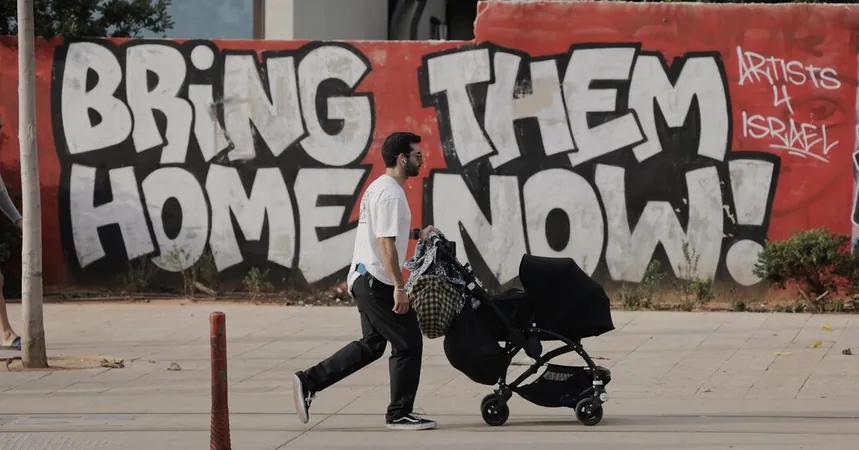
Historic Cease-Fire Deal Approved by Israeli Security Cabinet: What You Need to Know!
2025-01-17
Author: Lok
In a major development, the Israeli Security Cabinet has approved a cease-fire deal brokered by Qatar and Egypt, signaling a potential end to the devastating conflict that has plagued the Gaza Strip. The ongoing war, which escalated following a surprise attack by Hamas militants on October 7, 2023, has resulted in the tragic deaths of tens of thousands of Palestinians and over a thousand Israelis killed during the initial assault.
Key Provisions of the Cease-Fire:
The agreement stipulates an initial six-week truce during which Israeli forces will retreat from populated areas, while Hamas is set to release 33 hostages, primarily women and elderly individuals. In a reciprocal gesture, Israel will release hundreds of Palestinian prisoners, including some convicted for attacks against Israelis. On Friday, the Israeli government disclosed a preliminary list of 95 Palestinian prisoners who will be released as part of this arrangement, with more names anticipated as the deal formalizes.
Controversial Reactions:
Despite the excitement surrounding the deal, it has not come without opposition. Itamar Ben-Gvir, Israel's hardline national security minister, has threatened to resign should the cease-fire proceed, arguing it would inadvertently empower Hamas in Gaza. While Ben-Gvir's threats cast a shadow over Prime Minister Benjamin Netanyahu's coalition, opposition lawmakers have signaled their support for the cease-fire, indicating a rift within the government.
International Involvement:
The urgency of brokering peace also saw President Joe Biden and President-elect Donald Trump mobilizing their resources for a quick resolution. In a recent appearance, Biden expressed his long-standing advocacy for preventing civilian casualties and urged Netanyahu to consider the legitimate concerns of the Palestinian people.
Continued Violence:
However, even after the announcement of the cease-fire, violence has persisted. Reports indicate that Israeli airstrikes in the Gaza Strip continued to claim lives, marking a stark contrast to the hopeful news of the cease-fire. While Israeli officials maintain they have taken steps to minimize civilian harm, these claims have been met with skepticism amid ongoing casualties.
A Community's Yearning for Reunification:
Families of the hostages continue to voice their anguish and hope regarding the deal's execution. Einav Zengauker, a mother whose son remains captive, stated, "Our role is to ensure the agreement is fully implemented." Meanwhile, concerns loom over the question of whether the cease-fire will transition into a sustainable peace that allows for the safe return of remaining hostages.
The Humanitarian Crisis:
As fighting raged, the health situation in Gaza worsened significantly. Reports confirm that half of Gaza’s hospitals are non-operational, necessitating the urgent deployment of medical supplies and aid. The World Health Organization has indicated that over $10 billion will be required for the reconstruction of Gaza's healthcare system in the coming years. In the face of this desperate need, aid organizations are pressing for enhanced medical evacuations for critically ill patients, most of whom lack access to proper treatment.
Final Thoughts:
While the newly approved cease-fire represents a glimmer of hope in the ongoing conflict, the path ahead remains fraught with complexities. The dual pressures of ensuring the return of hostages and addressing the humanitarian plight in Gaza depict a delicate balancing act for Israeli leadership and their international partners. Only time will tell if this deal will usher in lasting peace or if further turmoil lies ahead.
Stay tuned for more updates on this evolving story!
 Brasil (PT)
Brasil (PT)
 Canada (EN)
Canada (EN)
 Chile (ES)
Chile (ES)
 Česko (CS)
Česko (CS)
 대한민국 (KO)
대한민국 (KO)
 España (ES)
España (ES)
 France (FR)
France (FR)
 Hong Kong (EN)
Hong Kong (EN)
 Italia (IT)
Italia (IT)
 日本 (JA)
日本 (JA)
 Magyarország (HU)
Magyarország (HU)
 Norge (NO)
Norge (NO)
 Polska (PL)
Polska (PL)
 Schweiz (DE)
Schweiz (DE)
 Singapore (EN)
Singapore (EN)
 Sverige (SV)
Sverige (SV)
 Suomi (FI)
Suomi (FI)
 Türkiye (TR)
Türkiye (TR)
 الإمارات العربية المتحدة (AR)
الإمارات العربية المتحدة (AR)